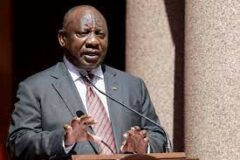South African President Cyril Ramaphosa announced changes to his Cabinet on Monday, including a new minister of electricity, amid the escalating power crisis in the country.
In a live national broadcast on Monday evening, Ramaphosa said, “The purpose of these changes is to ensure that the government is properly capacitated and directed to give effect to the commitments made in the State of the Nation Address and the Budget Speech (earlier this year).” “We have said that the people of South Africa want action, they want solutions and they want the government to work for them. All members of the Executive have been directed to focus on those agreed actions that will make a meaningful difference now, that will enable real progress within the next year and that will lay a foundation for a sustained recovery into the future,” he added.
Ramaphosa cited the priority issues that the government would have to address as being load shedding, unemployment, poverty and the rising cost of living and crime and corruption.
Acknowledging widespread public concerns about the delay in announcing the new Cabinet weeks after his commitment to do so, the president said this was due to “a number of processes that needed to be followed, some of which relate to the requirements of the Constitution relating to the appointment of members of the National Executive”.
“Understanding that just over one year remains in the term of this sixth administration, these changes are not about overhauling the National Executive. The changes that I am announcing now are intended to fill vacancies that have occurred in the Executive and direct the government more effectively towards the areas that require urgent and decisive action,” he said.
The two new positions announced were Dr Kgosientsho Ramokgopa as the minister of electricity and Maropene Ramokgopa as the minister with the specific responsibility of planning, monitoring and evaluation to focus greater attention on the government’s performance. Both would report directly to the president.
Naming widely-touted Paul Mashatile as the new deputy president to replace David Mabuza, who resigned last week, Ramaphosa also listed 11 ministers and 11 deputy ministers in existing portfolios, most of them new and a few being moved from other portfolios.
“The primary task of the new minister will be to significantly reduce the severity and frequency of load shedding as a matter of urgency. To effectively oversee the electricity crisis response, the appointed minister will have political responsibility, authority and control over all critical aspects of the Energy Action Plan,” Ramaphosa said.
With the governance of national electricity supplier Eskom currently spread across several different ministries, the new position is expected to urgently address the crisis at the embattled Eskom, which has had to introduce load shedding across the country in sessions totalling up to nine hours daily.
Once voted the world’s best electricity supplier, Eskom has been reduced to a bare shell with massive looting through state capture over the past decade and sabotage that has been identified at its power stations by corrupt suppliers and workers.
“The minister in the presidency for electricity will remain in office only for as long as it is necessary to resolve the electricity crisis,” Ramaphosa confirmed as he called on the new appointees to “adopt a zero-tolerance approach to corruption wherever it exists and place the interests of the people of South Africa foremost in the work that they do”.
Analysts had mixed reactions to the new appointments.
Some welcomed the new blood being brought into key posts while others decried the retention of non-performing and long-standing ministers in key posts such as mineral and energy affairs and local government.
Yet others said Ramaphosa had the unenviable task of keeping the different factions in his ruling African National Congress united ahead of the general election next year, which many have predicted will see the ANC lose the majority it has held since Nelson Mandela became the first democratically-elected president of South Africa in 1994.

